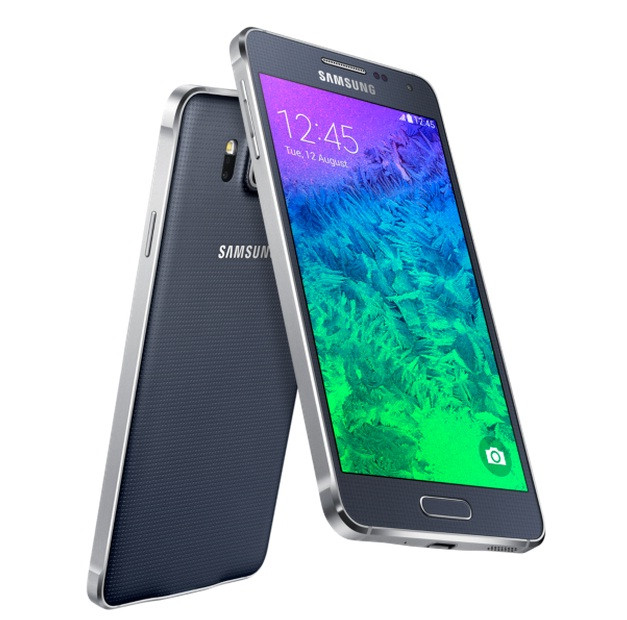Apple iPhone 6 vs Samsung Galaxy Alpha: Which One Should You Get?

Apple's iPhone 6 is being compared to numerous smartphones, including the OnePlus One. But here is another important comparison. Presenting the Samsung Galaxy Alpha, a smartphone which will serve as one of Samsung's main rivals against the iPhone 6.
Price
The Samsung Galaxy Alpha can be bought for £499.99, while the iPhone 6 starts at £539 for the 16GB variant. Check out our guide on best deals for the Galaxy Alpha in the UK.
Design
Apple takes the lead in this department with a gorgeous design that blends anodised aluminium, stainless steel, and glass. Hold it in your hand and you will agree that it feels absolutely premium.
In a surprise move, Samsung has finally come out with a phone that sports a metal chassis. The sides of the phone are exposed metal while the front and back are covered in glass and plastic.
Display
Apple uses a 5.5in LED-backlit IPS LCD display on the iPhone Plus. It has a resolution of 1080 x 1920 pixels and a pixel density of 401ppi.
Samsung uses a 4.7" Super AMOLED display with 720p resolution and 312ppi pixel density.
While both displays will deliver large amounts of detail, some users might prefer the Super AMOLED display on the Galaxy Alpha, thanks to its darker blacks, superior contrast and lower battery consumption.
Camera
While Apple might be stubborn in retaining an 8 megapixel sensor, the company has made changes and additions to help it click pictures better and faster than before, meaning that one of the most practical smartphone cameras might have just become better. There's also a 1.2 megapixel camera up front for selfies and video chats.
For those of you who like shooting videos, highlights include the ability to grab 1080p high-definition clips at 60 frames per second, take 240-fps slow-motion shots, and provide cinematic video stabilisation. all that video can be stored on up to 128GB, depending on which version you go for.
The Samsung Galaxy Alpha uses with a 12MP camera in the rear, which is capable of 2160p video @30fps, 1080p video @60fps and 720pvideo @120fps. Thanks to a 2.1 megapixel camera in the rear, it is also capable of a dual-camera feature. Other features include geo-tagging, touch focus, face and smile detection, panorama and HDR.
Performance
The iPhone Plus 6 uses an A8 chipset. There's a dual-core 1.4 GHz Cyclone (ARM v8-based) CPU and a PowerVR GX6650 (hexa-core graphics) GPU. There's also a new M8 motion co-processor that builds upon the introductory M7 that debuted with the iPhone 5s.
It can distinguish between sports such as cycling and running. It also can calculate distance and elevation using an onboard barometer to measure air pressure changes. Other additions include NFC, the Touch ID fingerprint sensor and more.
The Samsung Galaxy Alpha uses an Exynos 5 Octa 5430 chip, with a Quad-core 1.8 GHz Cortex-A15 & quad-core 1.3 GHz CPU and a Mali-T628 MP6 GPU. However, consumers would have preferred a Qualcomm processing package to this one given the smartphone's hefty price tag.
For memory, the iPhone 6 has no expandable storage and comes with 16GB, 64GB (£619) and 128GB (£619) internal storage options. The Galaxy Alpha also lacks expandable memory options and offers only 32GB of internal storage.
Bottom Line
Forget head-to-head reviews, the Samsung Galaxy Alpha has failed to beat Apple's iPhone 6 on the spec sheet itself. While Samsung has put in a lot of effort into making the phone, it offers very little that will tempt shoppers considering the iPhone 6.
Its only advantage happens to be its price point, but there are superior phones available for similar price tags. Candidates include the gorgeous Sony Xperia Z3, the metal-clad HTC One M8 and the LG G3, all of which offer superior specs.
If you are choosing between a Galaxy Alpha and and iPhone 6, then the latter is easily the better choice. However, you should consider these flagship smartphones as well before you make your purchase.
© Copyright IBTimes 2025. All rights reserved.






















